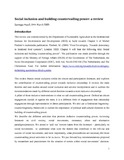| dc.contributor.author | Ripoll, Santiago | |
| dc.date.accessioned | 2018-07-02T15:41:00Z | |
| dc.date.available | 2018-07-02T15:41:00Z | |
| dc.date.issued | 2009-03 | |
| dc.identifier.citation | Ripoll, S. (2009) 'Social Inclusion and Building Countervailing Power: a Review', consultancy report commissioned by Michel Pimbert at the International Institute for Environment and Development (IIED) to contribute to Chapter 6 of his publication 'Towards Food Sovereignty: Reclaiming Autonomous Food Systems', 2009, London: IIED | en |
| dc.identifier.uri | https://opendocs.ids.ac.uk/opendocs/handle/20.500.12413/13846 | |
| dc.description.abstract | This review frames social exclusion within the citizen and participation literature, and explores the contributions of countervailing power towards inclusive citizenship. It reviews the main theories and case studies around social exclusion and adverse incorporation and it outlines the recommendations made by different social theorists towards a more inclusive citizenship.
A pillar of those inclusive interventions is what we call countervailing power. Defined as citizen engagement outside or against the state, it is a different form of engagement than citizenship engagement through representation or direct participation. We also use a Gramscian hegemony-counter-hegemony framework to outline the importance of political and cultural elements in the building of countervailing power. We describe the different activities that promote inclusive countervailing power, reviewing
literature on civil society, social movements, resistance, elites and alternative paradigms/practices. We aimed to ‘pull out’ lessons learnt from the literature – particularly on social movements- to understand what were the factors that contribute to the roll-out and success of social movements, and most importantly, what preconditions are necessary for those countervailing power activities to be inclusive. We put forward key recommendations proposed by researchers and practitioners for the creation of norms within social movements’ decision-making processes to ensure that subordinate groups and identities have a voice. After exploring in a little more detail examples of tensions between identities within the rural movements and feminist movements, a few examples on urban movements follow. | en |
| dc.description.abstract | This was part of the original body of work: 'Towards food sovereignty: reclaiming autonomous food systems', 2009, IIED, London.
The original publication was made possible through the generous support of the Ministry of Foreign Affairs (DGIS) of the Government of The Netherlands, the Swiss Development Cooperation (SDC), Irish Aid, Novib-OXFAM (The Netherlands) and The Christensen Fund.
For further information: https://www.iied.org/towards-food-sovereignty-reclaiming-autonomous-food-systems | |
| dc.description.sponsorship | Ministry of Foreign Affairs (DGIS) of the Government of The Netherlands | en |
| dc.description.sponsorship | Swiss Development Cooperation (SDC) | en |
| dc.description.sponsorship | Irish Aid | en |
| dc.description.sponsorship | Novib-OXFAM (The Netherlands) | en |
| dc.description.sponsorship | The Christensen Fund | en |
| dc.language.iso | en | en |
| dc.publisher | International Institute of Environment and Development (IIED) | en |
| dc.rights.uri | http://creativecommons.org/licenses/by/2.0/ | en |
| dc.subject | Governance | en |
| dc.title | Social Inclusion and Building Countervailing Power: a Review | en |
| dc.type | Other | en |
| dc.rights.holder | International Institute of Environment and Development (IIED) | en |
| dc.identifier.externaluri | https://www.iied.org/towards-food-sovereignty-reclaiming-autonomous-food-systems | en |
| rioxxterms.funder | Default funder | en |
| rioxxterms.identifier.project | Default project | en |
| rioxxterms.version | NA | en |
| rioxxterms.funder.project | 9ce4e4dc-26e9-4d78-96e9-15e4dcac0642 | en |


